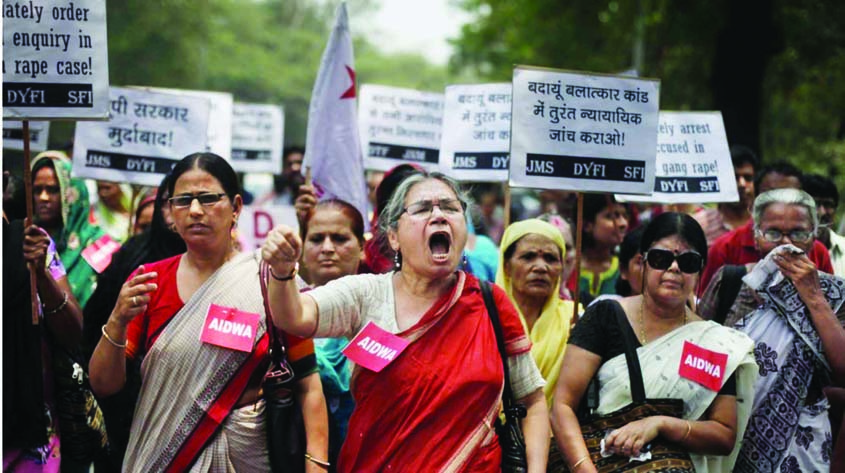“It took me quite a long time to develop a voice, and now that I have it, I am not going to be silent.” –Madeleine Albright
It all started with a hashtag. Our timelines, social media accounts and news channels were flooded with 2 simple words: “Me Too”. Millions of women; young and old, were sharing their stories. Their voices, that were silenced before they were even heard, were now reverberating throughout the country.
These voices brought about a wave of feminism to our humble abode. Those who knew about it, flaunted it like a badge of honour and those who didn’t, wanted to.
At the same time in some other part of the world, Emma Watson; a UN Goodwill Ambassador and outspoken feminist, posed topless for a leading magazine. What followed was loads of criticism, judgement and offensive jabs. This led me to wonder- Is the Youth selectively feminist?
To understand what selective feminism is, we must first ponder over the term it is derived from. At the crux of it all, feminism is about choice and equality. Not about gender, not about discrimination. Feminism is about empowering the oppressed, and giving them the freedom to make their own decisions and life paths.
Selective feminism is an extension to the term and serves as a new urban ‘trend’ that basically highlights inequality or discrimination, whenever it is beneficial. Let us take as an example, a person named Adi. Adi advocates for women’s rights and shares social media posts regarding their status in society. Adi also lectures people on the respect women deserve and don’t get. The same Adi, uses phrases like “You throw like a little girl!” as a way of insulting people. This is known as selective feminism. Easy enough?
Selective feminism is prominent in just about every aspect of modern life. The most protruding example is dress codes. While dress codes are applicable to both men and women, they are clearly more biased towards women, highlighting what they can and cannot wear,be it at age 10 or 50.
In a country where we’re taught to chant the mantra “Beti Bachao, Beti Padhao”, we come across lots of judgement against what a woman chooses to wear at her place of work. Be it at school, at an office at events or competitions, there are always limitations as to how women should dress. It is of utmost importance of course, to be dressed appropriately. But how does the length of a skirt determine the appropriateness of an outfit?
Every time a girl is sent back from her place of work, because her outfit is ‘too distracting’ or ‘too small’, she’s being told that her work or her education is less important than that of a man’s. By garnering her appearance as a distraction, a woman is being objectified and not being noticed for her merit or capability, but for what she chooses to dress like.
Coming back to the topic which we started from, what Emma Watson faced was hypocrisy and double standards at their finest. Women and men alike, who had previously applauded the young actress for standing up for women’s rights, were now bringing her down themselves. According to them, by posing topless for a commercial magazine, Emma had reduced females to just objects to be looked at. She had ‘went against her own words’. She had ‘given into the typical masculine expectations of women’. Therefore, she no longer deserved her label of being a proud and established feminist.
By doing this, people not only judged her character, but also stripped her of all the hard work she had done all her life. Being a feminist does not necessarily mean having to fit into a certain image. Being a feminist does not mean being an educated, working class woman. Anyone can be a feminist if they believe in equality. Equal rewards, equal work and equal opportunities.
An example closer to home is the plethora of Bollywood movies we see and enjoy every day. Every movie these days portrays the female lead as a strong, independent girl, living life on her own terms, but till where does this archetype hold?
A prominent mention is the movie Jab Harry Met Sejal. Sejal in the movie is shown as a typical, bubbly, girl-next-door, who also happens to be a lawyer. She speaks a lot about the coveted independence she has as a woman, and how she doesn’t mind taking the help of a man she doesn’t know, since she has full faith in her abilities to ‘protect herself’. The same independent, free thinking woman later judges women who have had past relationships with the male lead, Harry. She calls the women desperate, and tells Harry that she could never be like them.

Here, the director and the actor make use of feminism when it is beneficial to them, for added claps and cheers towards the female lead. But, when it isn’t convenient to the plot, they abandon this path of enlightenment and instead use slut-shaming as a punchline.
This wouldn’t have gathered much attention if it hadn’t been recent. Now that people are actually getting to know more about the concept of feminism, they are also forming opinions of their own regarding it. If they get influenced by such mainstream cinema, their ideas and opinions are going to be twisted and hence, the ignorance surrounding feminism will never end.
The youth of India expects more than just having an opinion based on convenience. We must take a stand, pick a side, rather than just watch from the sidelines and join the game when it suits us.
All this debate and debacle has only led to one clear point- when it comes to feminism, there is no black and white. But by picking and choosing when we want gender equality and when we do not, we are only reinforcing old stereotypes and sending women back to the 1950s.
In the end, is the future female after all?



